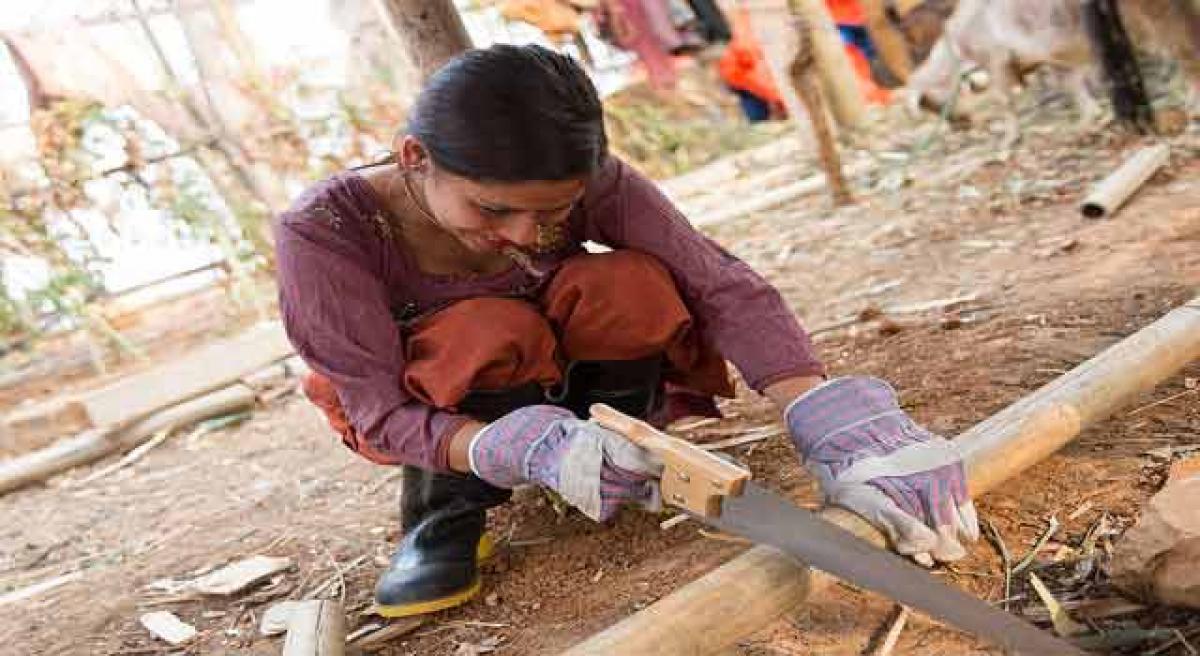Live
- 2024 on track to be hottest year on record
- PM Modi’s visit to Solapur: Women applaud ‘Double-Engine’ government’s initiatives
- Nagarkurnool MLA Dr. Kuchukulla Rajesh Reddy Campaigning in Maharashtra Elections
- Wife Kills Husband with Her Lover: Details of Veldanda Murder Case Revealed by SP Gaikwad
- Strict Action on Violations of Food Rights: Telangana Food Commission Chairman Goli Srinivas Reddy
- Smooth Conduct of Group-3 Exams with Strict Security Measures: Collector Badavath Santosh
- Delhi HC orders cancellation of LOC issued against Ashneer Grover, wife
- Shami’s absence a major blow for India in BGT, says Paul Adams
- Will organize protests at borders if attack on minority Hindus in Bangladesh not stopped: Bengal LoP
- Dutch Ambassador Marisa Gerard Meets Telangana CM A. Revanth Reddy in Delhi
Just In

Having lost her mother and brother, Shrijana, from Dolakha district in Nepal, has had to assume the role of financial caretaker of her family.
Having lost her mother and brother, Shrijana, from Dolakha district in Nepal, has had to assume the role of financial caretaker of her family.
With her newly-acquired building skills, Shrijana is currently building a temporary home for septuagenarian Krishna and her husband, who is ill and unable to rebuild. The elderly couple lost their home in the earthquake
The vibrant 21-year-old moved to Kathmandu three years ago to live with her uncle. She found a job in a shop selling MoMos, the famous Nepali dumplings and would send a large portion of her earnings back to her family in Dolakha.
But when her brother died in 2015, she decided to move back home to help care for her younger sisters, one aged seven and the other a baby.
When the massive earthquake struck Nepal on April 25, 2015, Shrijana and her family were working near her home.
Their home was heavily damaged, as was many others in the community, and the family lost most of their food, clothing and household items. Afterwards, she learned about Plan International’s masonry training and asked to be included.
Shrijana would be the youngest female mason to join the programme in her village. “I have gained such confidence, because I know I can do good things as a girl. Even though I face barriers, the mason training made me feel like a better person. I understood that women were able to do what men could do,” said Shrijana.
Her work has made her father proud. “She is like the son who bears the responsibility for the whole family. With my daughter’s support, I am able to look after my other daughters,” explained the 54-year-old.
“Previously, I would do the daily wage labour and manage our farm and livestock. But as I am getting older, day-byday, I am not able to do labour work. I am very happy with my daughter’s profession.
She is a role model for the entire community. I want to help her make her dreams come true.” In Nepal, the role of women as the head of the household is becoming a common scenario.
Often, women are left to run their household as their husbands, or their brothers or fathers, have left Nepal to work overseas. More than 2.2 million Nepalese work overseas, amounting to roughly 25 per cent of the country’s GDP, says the World Bank.
While Shrijana’s father remains in Nepal, his age has rendered him unable to work. The responsibility of looking after the home, the farm and livestock tend to fall on the shoulders of women, like Shrijana.
Shrijana learned about Plan International’s masonry training through her community and asked to be included. “At first, the community members told me I was too young, and not qualified, but I didn’t mind,” Shrijana says.
“There are 8 other female masons in the programme, but I am the youngest. The other women call me their daughter and supported me during the training. The other men in the training teased me if I didn’t know something or if I was unable to carry heavy things.
Despite the teasing, I was still determined to learn from them.” With her new building skills, Shrijana is currently building a temporary home for Krishna (76) and her husband, who is ill and unable to rebuild.
The elderly couple lost their home in the earthquake. They have seven children who visit the family in Dolakha, but who live in Kathmandu. “I am proud of her. She is doing well and proving that she is equal to a man.
She is doing hard labour. I have never seen a lady mason,” says Krishna. “When I was her age, there was no tradition of a woman being a mason. Women and girls were not allowed to go outside.
Women should move ahead in their life, they can learn skills, knowledge and experiences. They are now more educated, so they have the chance to learn more and share with others.” Shrijana will spend the next few weeks rebuilding Krishna’s temporary home, which will be built to withstand the coming monsoon season.
“My daughter taught me how to build. Together, we built a cattle shed and an outdoor kitchen made out of bamboo and tarpaulin (with materials provided by Plan International),” says the father.
With enough money, Shrijana hopes to build a permanent home. As the sole provider, however, she is still using the majority of her money to pay for her family’s day to day needs.
By:Jessica Lomelin

© 2024 Hyderabad Media House Limited/The Hans India. All rights reserved. Powered by hocalwire.com







